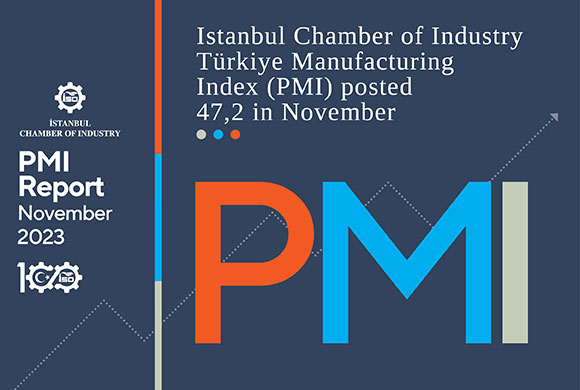News
ICI Released November 2023 Türkiye Manufacturing PMI and Türkiye Sector PMI Report
- 01.12.2023
- News

The Istanbul Chamber of Industry Türkiye Manufacturing PMI dropped to 47.2 in November from 48.4 in September, remaining below the 50.0 no-change mark for the fifth consecutive month and pointing to a solid moderation in business conditions. In fact, the latest slowdown was the most marked for a year. Purchasing activity and inventories of both inputs and finished goods were also lowered during the course of the month.
According to the October report of Istanbul Chamber of Industry Türkiye Sector PMI, three of the 10 monitored sectors increased their output, with slowdowns in employment in most of the sectors. Meanwhile, currency weakness again caused increases in input costs and output prices, causing the rate of input cost inflation to increase.
The November 2023 period of Istanbul Chamber of Industry (ISO) Türkiye Manufacturing PMI (Purchasing Managers’ Index) survey, which is the fastest and most reliable reference accepted in manufacturing industry performance of the economic growth, was announced. According to the results of the survey where any figure greater than 50.0 indicates overall improvement of the sector, the headline PMI dropped to 47.2 in November from 48.4 in October, below the 50.0 no-change mark for the fifth consecutive month. In fact, the latest slowdown was the most marked for a year.
Subdued market conditions both at home and abroad meant that new orders eased again midway through the final quarter of the year, and to the greatest extent since November 2022. Production was also scaled back to the largest degree for a year as manufacturers responded to demand weakness. Conflicts around the world and difficulties securing raw materials also contributed to the moderation of production, according to respondents. Reduced output requirements meant that manufacturers scaled back their staffing levels for the second successive month, with resignations and retirements also contributing to the modest easing of employment.
The latest slowdown was the most marked since October 2022. Data of November shows that Turkish manufacturing sector scaled back its staffing levels for the second successive month. Though modest, it reached to the highest extent in more than one year. Resignations and retirements also contributed to the modest easing of employment according to the panelists.
INPUT PRICES EFFECTIVE IN INFLATION
Purchasing activity and inventories of both inputs and finished goods were also lowered during the course of the month. The rate of input cost inflation eased to a six-month low in November, but remained marked amid widespread reports that currency weakness had pushed up prices for materials. Manufacturers subsequently increased their own selling prices, with the rate of charge inflation unchanged from that seen in the previous survey period.
Commenting on the Istanbul Chamber of Industry Türkiye Manufacturing PMI survey data, Andrew Harker, Economics Director at S&P Global Market Intelligence, said:
“The latest Türkiye manufacturing PMI data makes for concerning reading as it shows the slowdown in the sector gathering momentum as the year draws to a close. Widespread demand weakness, both at home and abroad, is making it increasingly difficult for firms to secure new business and leading to the scaling back of output, employment and purchasing.”
GROWTH IN 3 SECTORS ONLY
Istanbul Chamber of Industry Türkiye Sector PMI October report pointed out that the weakness in the operating conditions of the manufacturing industry was widespread in November as well. While a limited number of sectors showed signs of recovery during the month, a significant slowdown was recorded, especially in clothing and leather products. Output volume of the clothing and leather products sector decreased at the highest rate since the first wave of the COVID-19 epidemic in November and there was a slowdown in six more sectors, thus growth was limited to only three sectors. Land and sea vehicles production improved and recorded a strong increase for the first time in the last three months. Moderate increases were seen in food products and non-metallic mineral products.
While three sectors, led by food products, increased their new order volume, orders for electrical and electronic products remained flat after the decrease in the previous month. New orders decreased in the majority of sectors, but given the fact that the decline was spread across all sectors in October, this represented a relative improvement on a monthly basis. Growth in new export orders was seen only in the food products and machinery and metal products sectors.
LOSS OF MOMENTUM IN PURCHASING ACTIVITIES
Although some sectors increased their staffing levels, the majority by a narrow margin experienced a decrease. The sharpest decrease occurred in clothing and leather products, with the fastest pace in more than three and a half years. Similar to employment, purchasing activities also lost momentum in six out of ten sectors in November. Currency weakness again caused increases in input costs and output prices, causing the rate of input cost inflation to increase. The fastest increase was seen in food products, while the most moderate increase was in base metals. In the base metals sector, the sales prices increased at the lowest rate. This increase followed the decline experienced in the previous survey period. The sharpest increase in sales price inflation was recorded in machinery and metal products.
The data signaled easing on the pressure on supply chains with the weakening in input demand. Lead times shortened in three sectors with the most significant improvement in textile sector. The increase in lead times accelerated only in the machinery and metal products and basic metal sectors.
* You can find attached the Istanbul Chamber of Industry Türkiye Manufacturing PMI and Sector PMI November 2023 reports.